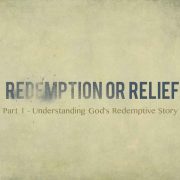Redemption or Relief – Part 1 – Understanding God’s Redemptive Story
This is the first installment of a short blog series titled Redemption or Relief. I hope that this will be an encouragement to our church as we follow Christ together. As you read I encourage you to ask yourself this question, “Would I be satisfied if the only thing redeeming in this suffering were that it gave glory to God?”
Introduction
What hope can be given to a young man whose life changed 3 years ago in an accident? Every day is marked with confusion and pain. A middle-aged father of 2 teen boys is on the verge of loosing his job, suffering from multiple medical conditions, the inability to think clearly and an ever-growing mountain of health bills. The feeling of helplessness grows with every moment. A young mother of 4, is given the diagnosis of a debilitating degenerative disease, for which there is no known cure, that will render her with the inability to care for herself in the near future. She experiences a deep longing to be healthy again, that will likely never be satisfied. A frail elderly woman who’s helpless feeling grows daily as she watches her husband’s once brilliant mind deteriorate under the scourge of Alzheimer’s. She fears the day when he will no longer remember her name. Each of these people is suffering and there is no end in sight. They yearn for relief. They have and are pursuing every medical lead, and yet there seems to be no answers.
Each of these men and women are facing different medical issues. None of them have answers, and all of them are losing hope because there is no light at the end of the tunnel. They all desire to be healed from their maladies so they can function as ‘normal’ people. The temptation to believe that they cannot be ok unless their bodies are healed is very strong. God has a grand plan for each of these people, a plan that transcends simple physical relief, a bigger story that climaxes at redemption. The gospel gives hope to these suffering men and women by leading them to seek redemption over relief, by understanding God’s redemptive story, recognizing the world’s distorted story and following Jesus’ perfect example.
Creation
There was not always suffering and disease. The world that God created was perfect. He created man in His image and gave him authority over His creation. He blessed man with the work of filling the earth and caring for it. He provided man with food from every tree in the garden to enjoy and nourish his body. God designed the perfect companion for man and called her woman. They enjoyed daily fellowship with God. The earth reflected its Creator. There was no shame, no pain and no disease. When the creation was finished God proclaimed, “It was very good.”
Fall
Man rebelled against God and all of this changed. The storyline became distorted by sin (Rom 5:12). Everything fell and the world was radically transformed as sin began its destructive work upon the lines of history. God’s creation was cursed. Man had to labor, by the sweat of his brow, to provide for his family. His relationship with his wife was damaged and the seeds of conflict were sown. It is here that we see pain enter the world as part of the curse associated with childbirth (Gen 3:14). But worst of all the entrance of sin demanded that man be separated from the holy God and sentenced to death. Adam and Eve were kicked out of the garden. Disease, pain and suffering became a part of the daily expectations of life. No one escapes these effects of the fall.
This should give those who are suffering insight into the source of their suffering. Often people ask, “How could a loving God allow people to suffer like this?” The answer is that God’s justice demanded the curse against sin. Man’s rebellion against God is the cause for suffering. This is not to say your suffering is outside of God’s control. On the contrary God uses the very effects of the curse to draw us to Himself. He did not curse the world for sin without adding to the storyline the hope of redemption and restoration.
Redemption
In the very words of the curse God gave the promise of redemption. “I will put enmity between you and the woman, and between your offspring and her offspring; he shall bruise your head, and you shall bruise his heel (Gen 3:15).”[1] This is where Jesus is introduced into the storyline. “When the fullness of time had come, God sent forth his Son, born of woman, born under the law, to redeem those who were under the law, so that we might receive adoption as sons (Gal 4:4–5).” On the cross Jesus paid the penalty for man’s sin in full and offers His righteousness to those who will turn from their sin to Jesus through believing in Him as their Savior and Lord. Redemption begins the process in which God works in believer’s hearts transforming them into the image of Jesus. This process of sanctification does not bring relief from the physical effects of the curse. In fact it is through the tests of suffering that God gives joy and growth (Jas 1:1-4). God’s plan is not primarily to relieve suffering on this earth but instead to redeem it. Redemption gives purpose to pain and suffering that otherwise would seem purposeless. Elizabeth Wurtzel writes about her desire to have her circumstances match the suffering she felt inside, “That is all I want in life: for this pain to seem purposeful.”[2] Christ gives purpose to that which seems to be devoid of purpose, not always by giving relief, but by promising to redeem our suffering.
Restoration
“Without God’s story, everyone should be depressed, hopeless, and despairing because, with all the counterfeit stories, everything we deeply cherish comes to ruins in the end.”[3] God’s redemptive narrative does not culminate in a battle against suffering in which relief is impossible. He offers something infinitely better. The ultimate purpose of redemption is restoration. Jesus died on the cross to restore the relationship that was broken at the curse. He suffered in this temporal world to purchase eternal restoration with God. The disease, pain and suffering of this world will be utterly obliterated. The 20th Century Anglican scholar John Wenhem wrote, “The toils which seem so endless will be seen to have been quite transitory and abundantly worthwhile.”[4] The apostle John records this amazing scene of final restoration, “He will wipe away every tear from their eyes, and death shall be no more, neither shall there be mourning, nor crying, nor pain anymore, for the former things have passed away (Rev 21:4).” The rift that was caused by sin will be utterly destroyed when Satan is defeated once and for all (Rev 20:10). God promises to make all things new (Rev 21:1-5). In eternity there will be complete freedom from the curse and the ravaging effects of sin. This restoration is not the end, but the beginning of a new story in a new and perfect world. C.S. Lewis describes this in his last statement in Chronicles of Narnia. As he describes the children’s fear of being sent out of Aslan’s presence and back to their world, the shadow lands, Aslan, the lion that represents God, comforts them by telling them,
“The dream is ended: this is the morning.”
And as He spoke, He no longer looked to them like a lion; but the things that began to happen after that were so great and beautiful that I cannot write them. And for us this the end of all the stories, and we can most truly say that they all lived happily ever after. But for them it was only the beginning of the real story. All their life in this world and all their adventures in Narnia had only been the cover and the title page: now at last they were beginning Chapter One of the Great Story which no one on earth has read: which goes on for ever: in which every chapter is better than the one before.[5]
The world attempts to distort Christ’s work of redemption. It bypasses the focal point of God’s story and offers a substitute relief. Relief is what each person who is suffering so desires, but it is not always best. “Redemption is Christ’s saving work viewed as an act of “buying back” sinners out of their bondage to sin and to Satan through the payment of a ransom.”[6] God desires to redeem man’s suffering by restoring His relationship with them through Christ’s work on the cross.
____________________________
[1] Unless otherwise noted all Scripture quotations are from the ESV translation.
[2] Elizabeth Wurtzel, Prozac Nation: Young and Depressed in America (New York, N.Y.: Riverhead Books, ©2000), 50.
[3] Edward T. Welch, Depression: Looking up from the Stubborn Darkness (Greensboro, NC: New Growth Press, ©2011), 227.
[4] Ron Rhodes, Why Do Bad Things Happen If God Is Good? (Eugene, Or.: Harvest House Publishers, ©2004), 225.
[5] C S. Lewis, The Chronicles of Narnia, vol. 7, The Last Battle (New York: HarperTrophy, 1994, ©1956), 228.
[6] Wayne Grudem, Systematic Theology: An Introduction to Biblical Doctrine, Bits & Bytes/Accordance electronic ed. (Grand Rapids: Zondervan, 2008), 1253.




